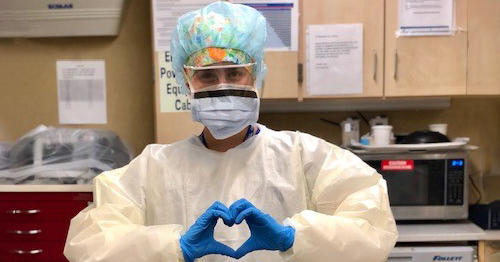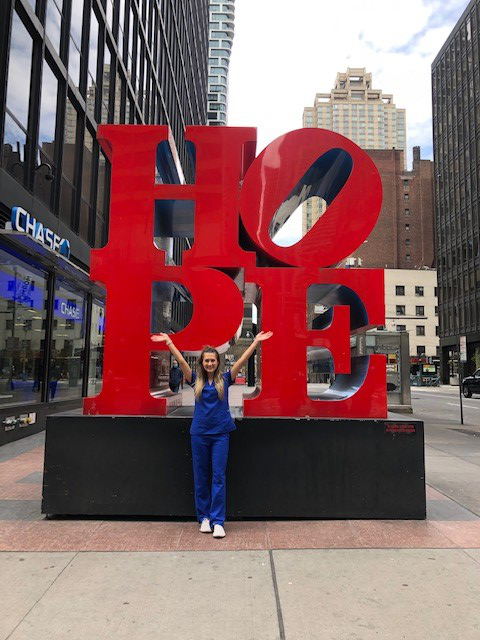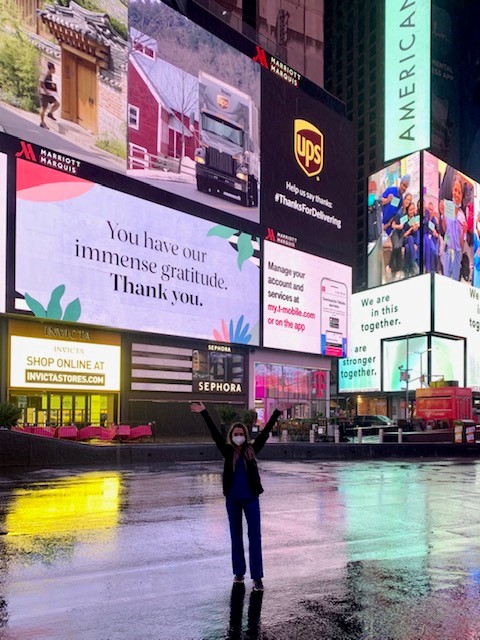Life on the Front Lines: A TTUHSC Nursing Graduate Shares Her Experience

For the past few weeks, Alyssa Springfield, RN, graduate of the Texas Tech University Health Sciences Center (TTUHSC) School of Nursing, has dedicated herself to flattening the curve and healing the sick at the epicenter for coronavirus in the United States—New York City.
Springfield and her close friend and fellow nurse Lauren Flanagan committed to 21 days of 12-hour shifts in the city through a staffing firm called Krucial Staffing—a firm designed to assist in disasters and emergencies by deploying clinical professionals from across the country to help those in need.
Springfield and Flanagan said they wanted to use their skills to alleviate the overwhelming strain on New York City health care workers during this pandemic. Despite understanding the high level of risk involved, Springfield said she felt compelled to help in any way she could.
“Having a background in ICU and critical care, I truly felt qualified and obligated to respond and relieve in this crisis” said Springfield, who saw deployment to New York as a responsibility to provide for her country—like a soldier going off to war.
“Seeing as this virus attacks the vulnerable, the elderly, and more specifically men rather than women,” said Springfield, “I felt called to serve my country through this opportunity.”
Upon arrival, Krucial Staffing provided each nurse with a hotel room located in the heart of Times Square. Sadly, New York City is not the popular tourist attraction it was just months ago, and Springfield and her cohorts were not there to explore the historic city. Instead, Springfield’s journey would take her to a hospital in Brooklyn, where health care workers were short-staffed, short on space, and short on materials.
Hospital Conditions
Like many in her position, Springfield was placed in a pediatric unit which was converted into a makeshift ICU. COVID-19 patients often develop Acute Respiratory Distress Syndrome (ARDS), which makes ventilators in high demand. According to Springfield, these types of patients who are intubated and on ventilators are usually on continuous monitoring, sedation, and paralytic medications used in conjunction to heal the lungs.
Springfield explained that in order to optimize the patients’ respiratory status, it is common to place patients in the prone position, or on their stomachs rather than their backs.
“When I have treated patients like this in the past, they’ve been on continuous drips of paralytic medications, pain medications, and sedatives.” said Springfield. “However, the hospital systems here are out of paralytic drugs, so we are doing what we can to keep them comfortable as best we can.”
Medication for patients’ optimal comfort is not the only resource that is depleted among New York City hospitals. Springfield explained that, while many patients need to be on transport monitors for extended amounts of time, there are individuals who are not on continuous monitoring at all due to a lack of availability of the monitors.
Before her travels to New York City, Springfield was informed of the growing shortage of personal protective equipment (PPE). The hospital in Brooklyn was no exception.
While the Centers for Disease Control (CDC) recommends an N95 mask, goggles, gloves, a face shield and an isolation gown, Springfield said that the hospital’s provisions are not so extensive.
“The only thing the hospital is required to give us is an N95 mask, gloves, and an isolation gown when caring for these patients,” said Springfield, who had to turn to loved ones for support. Fortunately, her community came together to help.
“When we first arrived and discovered this, we shared our needs via social media,” explained Springfield. “The response from friends and family has been incredible.”
Help From Across the Nation

Though resources are low, the presence of agency nurses like Springfield is drastically changing the course of the COVID crisis for the better. In fact, Springfield said that at the Brooklyn hospital where she was placed, roughly 95% of the staffing is made up of agency nurses.
“The nurses here say that things were so much worse a few weeks before agency nurses like me got here to relieve some of the load,” said Springfield. “Staff nurses are quitting, calling in, have had loved ones die from COVID or have had COVID themselves. That leaves only a few nurses to care for an overwhelming amount of patients.”
Springfield’s fellow agency nurses travelled from all across the country, brought together by determination in a desperate time.
“It’s amazing to see Americans coming together to fight on the front lines,” said Springfield. “We have a bond that will last a lifetime—no one else will ever quite understand what we are enduring.”
While she was honored to meet nurses from so many other states, Springfield was happy to see some TTUHSC representation as well.
“I am sure to represent the double-T every day on my badge,” she said. “I have seen a few other Red Raider nurses and it’s easy to pick them out when I see them ‘repping’ the scarlet and black surgical caps!”
Even as these health care workers return daily to long hours in stressful environments, Springfield expressed gratitude for the ways in which she has grown.
“Before this mission, the maximum number of 12-hour shifts I had ever worked was 6 days in a row,” said Springfield, who credits the hardships for allowing her to push through physical and mental barriers during her stay.
“Once I got into the routine of sleeping, eating, nursing, and repeating, I became accustomed to it,” she said. “With that mindset, the support of family and friends back home and the support here in New York City, I’ve been able to persevere.”
Silence in the City that Never Sleeps

COVID-19 has brought grief and anxiety to so many during this pandemic. Health care workers have experienced unspeakable strain, both physically and emotionally. Springfield said that she found the strength to keep fighting from her very first day in the once-bustling city.
“The first night we arrived, we walked over to Times Square,” said Springfield, who added that she had always dreamed of living in New York City.
“Times Square specifically has a vibrant energy I love,” she explained. But instead of experiencing the infectious energy of the city, she and her colleagues found themselves alone.
“We were greeted by an eerie and uncomfortable silence,” said Springfield. “There was no honking, no traffic, no buzzing and no action taking place in one of the busiest attractions in the most populated city in America.”
While it was a surprise that broke her heart, this scene was the motivation she truly needed.
“I finally grasped the harsh reality of the world we are living in,” Springfield said. “At the same time, I felt more empowered than I ever have in my entire life.”
Protecting Our Future
The people of New York City have shown Springfield and her fellow nurses their gratitude for the selfless assistance they have provided, but there is still so much left to be done—both in New York City and around the United States.
Springfield expressed fear of a second wave of COVID-19 during winter months, should a vaccine not yet be available. When speaking of the many unknowns still surrounding this pandemic, she explained that research is regularly turning out new information about the virus.
“We are learning that COVID does not only affect the respiratory system, but coagulability—or the blood’s clotting mechanisms—as well,” said Springfield. “People have been coming in with unexplained blood clots ranging from Deep Vein Thrombosis’s (DVTs), Pulmonary Embolisms (PEs), ischemic strokes and heart attacks.”
Springfield has received first-hand experience of a constantly shifting world—both in the treatment of patients and in government regulations—and learned to adapt accordingly.
“Being flexible is essential each day, or night in my case,” said Springfield. “As regulations and guidelines are changing each day on a national level, as well as locally, I have learned to expect change.”
Despite this flexibility, Springfield expressed a desire, shared by so many in this crisis, for a “return to normal.” In order to accomplish that, Springfield encouraged individuals across the country to practice extreme caution, abide by social distancing, and follow the CDC’s guidelines.
“Seeing coronavirus take the lives of so many on such a huge scale has been eye opening—and this could happen anywhere, even Lubbock,” Springfield said. “Please be extra careful and take all the necessary measures to protect yourself and your loved ones.”
At the close of their 21-day contract, Springfield’s work in the city was still crucial, and she wanted to continue that assistance. She and Flanagan extended their contracts an extra week. Their final day in New York City is Sunday, May 10.
Related Stories
Celebrating Veterans: TTUHSC’s General Martin Clay’s Legacy of Service and Leadership
From his initial enlistment in the Army National Guard 36 years ago to his leadership in military and civilian health care management roles, Major General Martin Clay’s career has been shaped by adaptability, mission focus and service to others.
Texas Tech University Health Sciences Center School of Nursing Named Best Accelerated Bachelor of Science in Nursing Program in Texas
The TTUHSC School of Nursing Accelerated Bachelor of Science in Nursing (BSN) program has been ranked the No. 1 accelerated nursing program in Texas by RegisteredNursing.org.
TTUHSC Names New Regional Dean for the School of Nursing
Louise Rice, DNP, RN, has been named regional dean of the TTUHSC School of Nursing on the Amarillo campus.
Recent Stories
National Academy of Inventors Names TTUHSC Faculty Senior Members
The National Academy of Inventors (NAI) has designated two current and one former TTUHSC faculty researchers as Senior Members.
The John Wayne Cancer Foundation Surgical Oncology Fellowship Program at Texas Tech University Health Sciences Center Announced
TTUHSC is collaborating with the John Wayne Cancer Foundation and has established the Big Cure Endowment, which supports the university’s efforts to reduce cancer incidence and increase survivability of people in rural and underserved areas.
TTUHSC Receives $1 Million Gift from Amarillo National Bank to Expand and Enhance Pediatric Care in the Panhandle
TTUHSC School of Medicine leaders accepted a $1 million philanthropic gift from Amarillo National Bank on Tuesday (Feb. 10), marking a transformational investment in pediatric care for the Texas Panhandle.
